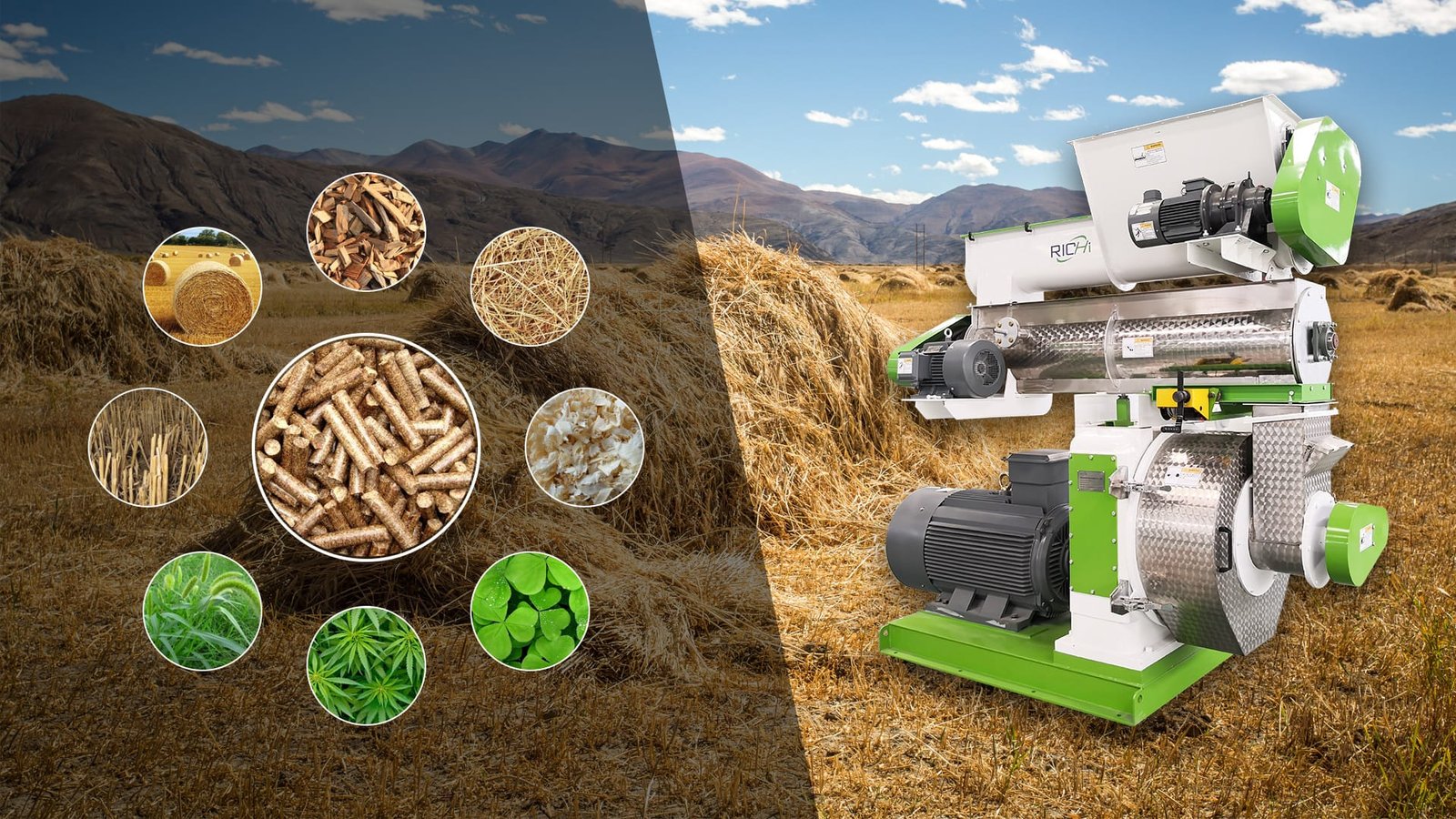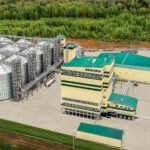Alfalfa pellet machine is a specialized piece of equipment designed to convert alfalfa and other biomass materials into compacted pellets. These pellets serve as a convenient and nutritious feed source for livestock, poultry, and other animals. With the ability to process alfalfa into pellets, farmers and feed producers can enhance feed quality, reduce wastage, and optimize animal nutrition.
Market Analysis: The demand for alfalfa pellet machines has been steadily increasing in recent years, driven by several factors. Firstly, the growing awareness of the importance of high-quality feed in animal nutrition has spurred demand for advanced feed processing technologies. Additionally, the rise of intensive livestock farming practices has created a need for efficient feed production solutions to meet the demands of a growing population.
Profit Point Analysis: Investing in an alfalfa pellet machine offers significant profit potential for feed producers and farmers alike. By converting raw alfalfa into pellets, producers can increase the value of their feed products and command higher prices in the market. Moreover, the efficiency and consistency offered by pellet machines result in reduced feed wastage and improved feed conversion ratios, ultimately leading to higher profitability.
Working Principle and Application: Alfalfa pellet machines operate on the principle of compression, where raw alfalfa material is fed into the machine and compressed into pellets under high pressure. The pellets are then cooled and hardened before being bagged or stored for use. These machines come in various configurations, including flat die and ring die pellet mills, each suited to different production capacities and requirements.
In the agricultural industry, alfalfa pellets find applications in various sectors, including:
- Livestock farming: Used as a primary feed source for cattle, sheep, goats, and other ruminants.
- Poultry farming: Employed as a supplementary feed for chickens, turkeys, and ducks.
- Horse feed: Valued for its high protein and fiber content, ideal for equine diets.
- Biomass fuel: Utilized as a renewable energy source for heating and power generation.

Alfalfa Pellet Production Line Challenges and Solutions:
In the realm of alfalfa pellet production lines, real-world projects often encounter technical hurdles that require astute problem-solving to ensure smooth operation and optimal output. Let’s delve into a few project cases ranging from 2 to 100 tons per hour, highlighting the encountered technical challenges and their resolutions:
Case Study 1: 2 Tons per Hour Production Line
Technical Problem: Insufficient Pellet Density
- Challenge: Despite consistent raw material quality and machine settings, the pellets were coming out with lower density than desired, affecting their durability and nutritional value.
- Solution: After meticulous analysis, it was discovered that the compression ratio of the ring die needed adjustment to achieve the desired pellet density. By fine-tuning the die specifications and optimizing the compression parameters, the issue was resolved, resulting in pellets with the desired density and durability.
Case Study 2: 20 Tons per Hour Production Line
Technical Problem: Equipment Overheating
- Challenge: During peak production periods, the pellet mill and associated equipment were experiencing frequent overheating, leading to downtime and reduced efficiency.
- Solution: A comprehensive thermal analysis revealed that inadequate cooling capacity was the root cause of the overheating issue. Upgrading the cooling systems, including the addition of larger capacity fans and improved heat dissipation mechanisms, effectively mitigated the problem, ensuring stable operation even during high-demand periods.
Case Study 3: 100 Tons per Hour Production Line
Technical Problem: Uneven Pellet Size Distribution
- Challenge: Despite employing advanced equipment and meticulous process control, the production line was yielding pellets with inconsistent size distribution, impacting product quality and market acceptance.
- Solution: A systematic analysis of the entire production process, from raw material preparation to pellet formation, revealed minor variations in material flow and die wear as contributing factors to the uneven pellet size distribution. Implementing stricter quality control measures, including regular die inspections and adjustments, as well as optimizing material flow dynamics, effectively addressed the issue, resulting in uniform pellet size distribution across the entire production line.
In each of these project cases, the encountered technical challenges were addressed through a combination of systematic analysis, innovative problem-solving, and targeted adjustments to equipment and processes.
By leveraging technical expertise and industry best practices, these alfalfa pellet production lines were able to overcome obstacles and achieve optimal performance, highlighting the importance of proactive technical support and continuous improvement in the field of feed pellet production.
Why Choose RICHI Machinery for Alfalfa Pellet Machines?
RICHI Machinery stands out as a trusted partner for alfalfa pellet production, offering unparalleled expertise, reliability, and support. With years of experience in the industry, RICHI Machinery understands the intricacies of feed production and is committed to delivering cutting-edge solutions that drive success for its customers. By choosing RICHI Machinery, customers benefit from:
- Advanced technology: RICHI Machinery’s state-of-the-art equipment and innovative solutions are designed to optimize feed production processes and maximize output.
- Turnkey project capability: From initial planning to final installation and after-sales support, RICHI Machinery offers comprehensive turnkey project solutions, ensuring a seamless experience for customers.
- Customization: RICHI Machinery works closely with customers to understand their unique requirements and tailor solutions that meet their specific needs, from equipment configuration to production capacity.
- Support and service: With a global network of service centers and technical experts, RICHI Machinery provides ongoing support and assistance to customers, ensuring optimal performance and uptime for their pellet production lines.
Summary and Conclusion
In conclusion, alfalfa pellet machines play a pivotal role in modern feed production, offering efficiency, consistency, and versatility. Investing in an alfalfa pellet machine presents a lucrative opportunity for feed producers and farmers to enhance feed quality, reduce wastage, and improve profitability. Partnering with experienced suppliers such as RICHI Machinery ensures a seamless experience, from project design to installation and ongoing support.
With its advanced technology, turnkey project capability, and commitment to customer satisfaction, RICHI Machinery emerges as the ideal choice for alfalfa pellet production. Embrace the future of feed production with RICHI Machinery and unlock the full potential of your operation.
Frequently Asked Questions (FAQs) about Alfalfa Pellet Machines:
What is the typical production capacity of an alfalfa pellet machine?
Alfalfa pellet machines come in various sizes and configurations, with production capacities ranging from small-scale operations producing a few hundred kilograms per hour to large-scale facilities capable of producing several tons per hour.
What are the primary advantages of using alfalfa pellets in animal feed?
Alfalfa pellets offer several advantages, including improved feed quality, reduced wastage, enhanced nutritional value, and ease of handling and storage.
Can alfalfa pellet machines process other types of biomass materials?
Yes, alfalfa pellet machines can be used to process a wide range of biomass materials, including grasses, straw, wood chips, and agricultural residues, to produce pellets for various applications, including animal feed, biomass fuel, and more.
How do I choose the right alfalfa pellet machine for my operation?
When selecting an alfalfa pellet machine, consider factors such as production capacity, raw material availability, desired pellet quality, available space, and budget. Consulting with experienced suppliers such as RICHI Machinery can help you make an informed decision based on your specific requirements.
What are the key considerations when setting up an alfalfa pellet production line?
When setting up an alfalfa pellet production line, it’s essential to consider factors such as site selection, equipment selection, raw material sourcing, operational efficiency, and regulatory compliance. Conducting a thorough feasibility study and consulting with experienced suppliers like RICHI Machinery can help ensure a successful and sustainable operation.
What are the main challenges encountered during the installation of an alfalfa pellet production line?
Some common challenges during installation include site preparation, equipment setup, logistical issues, and coordination with contractors and suppliers. However, partnering with a reputable supplier like RICHI Machinery, known for its expertise and turnkey project capabilities, can streamline the installation process and mitigate potential challenges.
How can after-sales support from RICHI Machinery benefit customers?
RICHI Machinery offers comprehensive after-sales support, including training, maintenance, spare parts provision, and technical assistance. This ensures that customers can maximize the performance, efficiency, and longevity of their alfalfa pellet production lines, ultimately optimizing their return on investment.
Are alfalfa pellet machines environmentally friendly?
Yes, alfalfa pellet machines are environmentally friendly, as they enable the efficient utilization of biomass materials such as alfalfa, reducing waste and minimizing environmental impact. Additionally, pellets produced from renewable biomass sources offer a sustainable alternative to fossil fuels and contribute to carbon neutrality.
In conclusion, alfalfa pellet machines play a crucial role in modern feed production, offering efficiency, consistency, and sustainability. Partnering with experienced suppliers like RICHI Machinery ensures access to advanced technology, turnkey project capabilities, and comprehensive support services, ultimately enabling customers to achieve their feed production goals efficiently and effectively. Embrace the future of feed production with RICHI Machinery and unlock the full potential of your operation.

